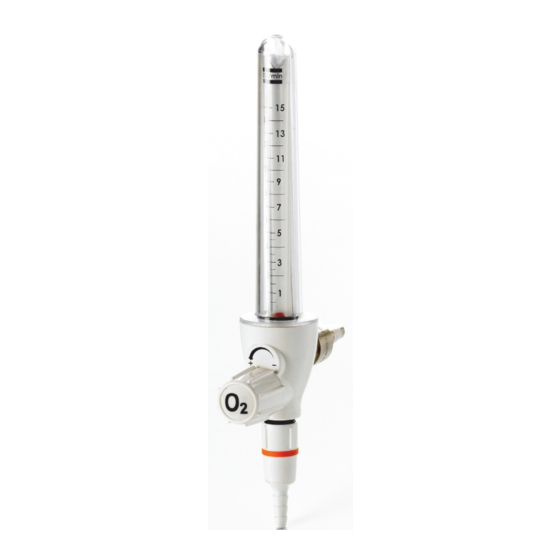Firesafe 829-0951 Instrukcja obsługi - Strona 9
Przeglądaj online lub pobierz pdf Instrukcja obsługi dla Przyrządy pomiarowe Firesafe 829-0951. Firesafe 829-0951 16 stron.

4.5.
During Use
Continue to monitor the level of gas flow during the procedure or therapy and the contents level of
the cylinder (if applicable) and be aware that the supply tubing and hose (if applicable) may be a
trip hazard.
4.6.
After Use
If the supply is from a gas cylinder, close the cylinder valve and disconnect the flowmeter when
therapy is no longer required.
5.
Cleaning and Disinfection
Ensure the flowmeter is disconnected from the gas supply before attempting to clean it.
Caution! The flowmeter is not suitable for autoclaving.
5.1.
Cleaning
Wipe over the outside of the flowmeter and the gas supply hose with an alcohol or disinfecting
wipe.
5.2.
Suspected Contamination
If you suspect that the flowmeter is contaminated, remove it from use and refer the device to the
appropriate department.
Never immerse the flowmeter in any fluid or attempt to clean internal parts.
6.
Maintenance
6.1.
Interim Inspection
The flowmeter should be regularly cleaned, inspected for damage and checked for performance.
The frequency of inspection and performance checks depends upon usage. As a guideline, if the
flowmeter is used daily this may need to be performed every six months; if used infrequently an
annual check may suffice.
6.1.1.
Leak Test
Attach the flowmeter to a low pressure medical gas supply with a nominal supply pressure as
specified on the rating label of the device and close the flow control valve. Connect supply tubing
to the outlet barb and immerse the other end of the tube in water, the presence of gas bubbles in
the water indicates a leak. Remove the tube and apply an oxygen compatible leak test solution to
all outlets and fittings and check for leaks. A flowmeter that fails these tests should be removed
from use.
6.1.2.
Flow Test
Verify flow rates at all flow settings against those given in the Device Specification in section 6.
Mass flow meters with appropriate full-scale ranges for the flow rates are particularly suitable for
this.
Alternatively, where flow measuring equipment is not available, a qualitative check can be
performed by confirming that gas flow can be sensed to be increasing with each step increase in
flow across the full flow range. For higher flow rates, this can be sensed audibly or by holding a
hand close to the flow outlet; moistening the skin can increase the cooling sensation and therefore
sensitivity to the flow.
For very flow rates, this may better be achieved by placing the end of a connected tube in a glass
of water to observe the bubbles.
7
